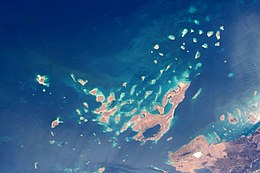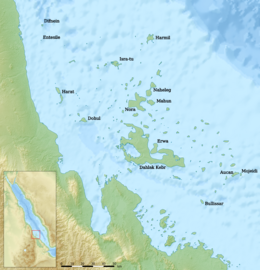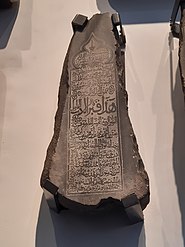 | |
 | |
 | |
| Geography | |
|---|---|
| Coordinates | 15°50′N 40°12′E / 15.833°N 40.200°E / 15.833; 40.200 |
| Adjacent to | Red Sea |
| Major islands | Dahlak Kebir, Dhuladhiya, Dissei, Dohul (Dehil), Erwa |
| Administration | |
| Demographics | |
| Population | c. 3,000 |
| Languages | Dahalik |
The Dahlak Archipelago is an Eritrean island group located in the Red Sea, measuring around 643 square km (248 square miles) and lying roughly 58 kilometers (31 nautical miles, 36 miles) east of Massawa, the regional capital city.
Etymology
| This section is empty. You can help by adding to it. (November 2024) |
History

G.W.B. Huntingford has identified with the Dahlak archipelago a group of islands near Adulis called "Alalaiou" in the Periplus of the Erythraean Sea which were a source of tortoise shell. According to Edward Ullendorff, the Dahlak islanders were amongst the first people in the Horn of Africa to embrace Islam, and a number of tombstones in Kufic script attest to this early connection.

In the 7th century, the Sultanate of Dahlak emerged in the archipelago. However, it was subsequently conquered by Yemen, then by the Ethiopian Empire. In 1517 the Ottoman Turks conquered the islands and placed them under the rule of the Pasha at Suakin as part of the province of Habesh. By 1526 the Dahalik sultan, Ahmad, had been degraded to a tributary. There was a short revival of the sultanate during the Abyssinian-Adal war, where the sultanate of Adal waged a temporarily successful jihad with the help of cannons and guns from the Ottomans against the Ethiopian Empire. Sultan Ahmad joined the Adal Empire and was rewarded with the port town of Arkiko, which before the war had belonged to Medri Bahri. However, in 1541, one year after the death of sultan Ahmad, the Portuguese returned and destroyed Dahlak yet again. Sixteen years later, the islands were occupied by the Ottoman Empire again, who made them part of the Habesh Eyalet.
The Italian colony of Eritrea, formed in 1890, included the archipelago. However, during this time the islands were home to little except the Nocra prison camp operated by the Italian colonial forces.
After Ethiopia allied itself with the Soviet Union during the Cold War, following the rise of the Derg, the Dahlak Archipelago was the location of a Soviet Navy base. In 1990, Ethiopia lost control of the Dahlak Archipelago and the northern Eritrean coast to the Eritrean independence movement (EPLF) and by 1991 Ethiopia had lost control of all of Eritrea. Following the international recognition of Eritrean independence in 1993, the Dahlak Archipelago became a part of Eritrea.
Geography
Consisting of two larger and 124 smaller islands, only three of the islands are permanently inhabited, with Dahlak Kebir being the largest and most populated. Other islands of the archipelago are Dhuladhiya, Dissei, Dohul (Dehil), Erwa, Harat, Harmil, Isra-Tu, Nahaleg, Nakura, Nora (Norah) and Shumma.
Demography
Besides Dahlak Kebir, only Nora and Dohul are permanently inhabited. Residents of the archipelago speak Dahlik and maintain a traditional way of life, including fishing, shepherding and raising camels. The local pearl fisheries of the archipelago have been famous since Roman times, and still produce a substantial number of pearls.
Access
Tourism is increasing. The islands can be reached by boat from Massawa and are popular with scuba divers and snorkellers.
Environment
The islands and surrounding seas, with their coral reefs and shoals, are rich in marine life, including seabirds and waders. Some islands are fringed with mangroves and others with salt brush scrub. Dolphins, dugongs, sharks, and turtles can be seen as well as a variety of invertebrates.
Important Bird Area
The archipelago has been designated an Important Bird Area (IBA) by BirdLife International because it supports significant populations of spotted sandgrouse, white-eyed gulls, lesser crested terns, lesser kestrels, sooty falcons, greater hoopoe-larks, blackstarts and cinereous buntings.
See also
References
- ^ "The Dahlak Archipelago". Eritrea.be. Archived from the original on 30 November 2016. Retrieved 24 November 2016.
- "tombstone | British Museum". The British Museum. Retrieved 2022-03-13.
- "Ethiopia: The Armed Forces". Archived from the original on 24 December 2007. Retrieved 25 October 2006.
- Harper, Mary (24 May 2016). "Eritrea celebrates 25 years of independence after war with Ethiopia". BBC News. Archived from the original on 15 September 2016. Retrieved 24 November 2016.
- "Eritrea's Dahlak Archipelago Islands are so remote, there is almost no tourism". 2 June 2019.
- "Dehalak Archipelago and offshore islands". BirdLife Data Zone. BirdLife International. 2024. Retrieved 2024-09-08.
External links
[REDACTED] Media related to Dahlak Archipelago at Wikimedia Commons
- Dahlak – Reef pearls of the Red Sea – Dahlak Islands informative site
- Dahlak Archipelago
- Massawa
- Northern Red Sea region
- Landforms of Eritrea
- Islands of the Red Sea
- Important Bird Areas of Red Sea islands
- Important Bird Areas of Eritrea
- Archipelagoes of the Indian Ocean
- Russian and Soviet Navy bases
- Military installations of the Soviet Union in other countries
- Ethiopia–Soviet Union relations